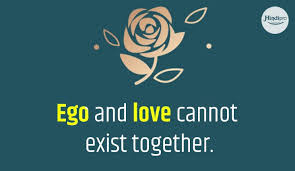Quote from true charm and Power of Vedanta
He Who
Steps of Hindu Philosophic Thought
The first group of religious ideas that we see coming up- I mean recognized religious ideas, and not the very low ideas, which do not deserve the name of religion – all include the idea of inspiration and revealed books and so forth. The first group of religious ideas starts with the idea of God. Here is the universe, and this universe is created by a certain Being. Everything that is in this universe has been created by Him. Along with that, at a later stage, comes the idea of soul-that there is this body, and something inside this body which is not the body. This is the most primitive idea of religion that we know. We can find a few followers of that in India, built it was given up very early. The Indian religions take a peculiar start. It is only by strict analysis, and much calculation and conjecture that we can ever think that that stage existed in Indian religions. The tangible state in which we find them is the next step, not the first one. At the earliest step the idea or creation is very peculiar, and it is that the whole universe is created out of zero, at the will of God, that all this universe did not exist, and out of this nothingness all this has come. In the next stage we find this conclusion is questioned. How can existence be produced out of non –existences? At the first step in the Vedanta this question is asked. If this universe is existent it must have come out of something, because it was very easy to see that noting comes out or nothing, anywhere. All work that is done by human hands requires materials. If a house is built the material was existing before; if a boat is made the material existed before; if any implements are made, the materials were existing before. so the effect is produced Naturally, therefore the first idea that this would was created out of nothing was rejected and some material out of which this world was crated was wanted. The whole history of religion in fact is this search after that material.
Meditation that
takes you beyond all limits
By Ashok Vohra
According to Maharishi Mahesh Yogi, ‘Mankind was not born to suffer,
mankind was born to enjoy. The purpose of life is to expand happiness.’ Human
beings can get rid of their suffering, attain a state of happiness and share it
with others by practising the technique of bhavateet dhyan, transcendental
meditation (TM). TM is withdrawal of consciousness and senses from the external
objects and concentration of the consciousness on the self.
Dhyan is different from upasana, the method of worship. Upasana depends on
the religion, faith upheld by one. So, there can be as many upasana padhatis,
methods of worship, as there are religions or sects. Dhyan means concentration
of mind on God, or self, or the Supreme principle, or even on shunyata,
nothingness. In Buddhism, almost a similar technique of dhyan is called
Vipassana. Upasana, on the other hand, is continuous thought of Him. For
example, naam jap, recitation of names of God, is a form of upasana.
The word ‘transcendental’ means ‘going beyond the limits of human
knowledge, experience, reason’. TM is a method of calming the mind and becoming
relaxed by thinking deeply in silence, and silently repeating a special word or
a syllable or series of words (mantra) many times in a row.
In the preface of Maharishi Mahesh Yogi’s Science of Being and Art of
Living, Charles F Lutes writes that the term ‘transcendental meditation’ though
seems very complicated and difficult to understand simply means a scientific
method of ‘communication with the Infinite’. It is scientific because it is
‘systematic and produces measurable and predictable results’. The outcome of TM
is ‘realisation and fulfilment of the art of realisation’.
The technique of transcendental meditation is religion, sect, or faith
neutral. It leads to the enhancement of one’s capacities to follow one’s own
faith more enthusiastically.
The chief purpose of this meditation technique is to ‘put one in touch
with his own essential self, the eternal Being within, by moving one’s
attention away from the surface consciousness of change, suffering and stress.
One then becomes the Absolute Being, an experience which Maharishi calls
“God-consciousness”’.
In fact, the practice does not require a prior understanding of any
philosophical theory.
All that is required of the practitioner is to recite twice a day for
about 15-20 minutes a syllable, or a string of words – mantra, with closed
eyes. The mantra is chosen by the trained teacher, guru, according to the need
of the practitioner. Since a guru is needed to understand the needs of the
learner and to initiate the learner into the correct technique, the TM is also
called guru-centred practice.
Regular practice of TM eliminates the negative feelings of stress and
fatigue and replaces them with the positive feeling of wellbeing. This change
has been scientifically proven by many researchers. Experiments in the
laboratories have established that TM ‘increased creativity and flexibility,
increased productivity, improved job satisfaction, improved relations with
supervisors and co-workers’ by creating a positive effect on the human mind and
body. TM is not a passive state, rather it is a ‘state of restful alertness
where the mind is awake but quiet, silent but alert’.
IF HE EXIST
I drive joy there was a doctor in
Benaras who spent 7 minutes in the morning and evening for mediation on God.
Knowing this, his colleagues and friends laughed at him. One day they argued
that he was wasting 7 precious minutes on something, which he had been misled
into believing. The doctor replied, “Well, if God does not exist, I agree that
I am wasting 7 minutes a day. But, if He exists? I am afraid you are wasting
your entire lifetime. I prefer to waste 7 minutes rather than a lifetime. Why
should you grudge me the 7minutes joy that I derive 4m.-
ILLUSTRATED REVIEW : 7th heaven moment in
test Sa won by 7 wk in ISL goa no 7 scored a goal





























